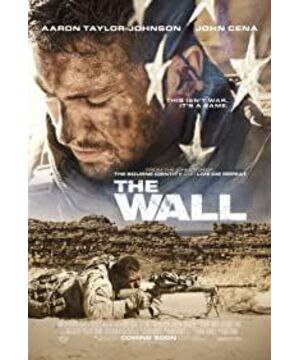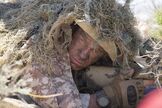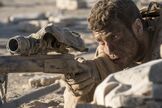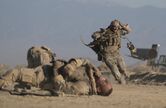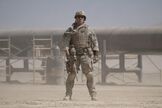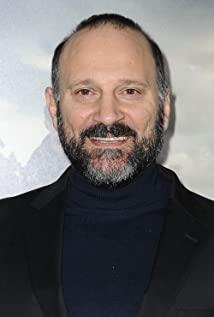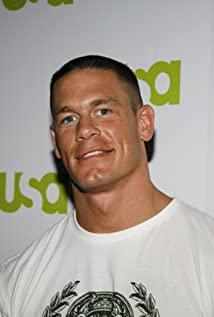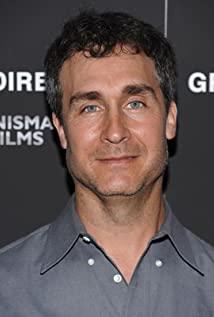12 A war movie released in the United States. Different from other war films, the director pulled the time of this film to two years after the Iraq War. Most of the US troops had already evacuated, there were no planes, tanks, no grand large-scale marching scenes, only a barren land. The film opens with a sniper scope being aimed. Two well-armed American soldiers in camouflage crouching in a bush - then we gradually learn through conversation that they were notified to investigate a sniper active at the pipeline construction base, and they were waiting the twentieth hour. Even the well-trained U.S. military has let down his guard after a long wait. Matthew decided to step forward to check, leaving Isaac alone to assist remotely. ). So far, the gags of the two have taken the audience away from the tension at the beginning. Matthew continued to walk in the courtyard to investigate, and the accident happened. A burst of sand and dust blew Isaac's vision. Matthew was instantly brought down by the sniper who had been hiding for a long time, and then the sniper shot three times. Isaac, who will be supported in the future, was injured and forced Retreat behind the bunker (wall)... The existence of the "wall" runs through the entire film. From the beginning, the two suspect whether the sniper will be behind the wall. The wall is unknown and belongs to the smoke bombs arranged by the sniper; then to Isaac Being hit in the knee and hiding behind the wall, the wall became Isaac's temporary shelter, and the wall at this time fulfilled the original meaning of the wall - protection. From another perspective of national interests, the wall initially represented the Iraqi wall, and then the US military wall. The story takes place at the end of the Iraq War, the US military occupied the wall belonging to the Iraqis to defend against Iraqi snipers (although the wall was loose), and also referred to an oil field where the two sides exchanged fire - I think the wall clearly represents a fragile fig leaf, A satire on the war the United States has provoked to plunder oil. Finally, from the perspective of the plot, the sniper in the later part of the film is teasing the exhausted Isaac and easily penetrates most of the walls with a gun. In fact, in the film, after he starts talking to Isaac, he has countless opportunities to shoot him. , we were able to determine: Isaac's wall didn't actually protect him, and what saved him temporarily was the sniper's wilder plan to use the information obtained from chatting with Isaac to send reinforcements from the US military. One pot side. In addition to the main plot, there are three coincidences in the film. The first coincidence is that the sand and dust destroyed Isaac's vision. The screenwriter made the film reach a small climax through the coincidence of "sand and dust", allowing us to see the horror of the opponent - imagine, if there is no sand and dust to obscure the enemy's vision , whether the sniper will never shoot, ultimately leading to the "wall". I think this is where the story really begins. The second coincidence is that Matthew, who was seriously injured and comatose, accidentally woke up and was accidentally exposed when he was about to shoot a sniper with a sniper rifle. This is the second best friend he killed. The third coincidence exists in Isaac's recollection, in which Isaac shot Dean and chose to lie about Dean's death for his own impunity, which also made him face the sniper in the back Completely crashed when questioned. It's a tragic story, but the tragedy that people see is probably just this: despite Isaac's best efforts to outwit the snipers, the snipers killed everyone, including the helicopters that came to support. It's not just that! First of all, the director made full use of Isaac, so that he kept provoking conflicts. All kinds of actions that seemed to be able to turn the tables were finally turned into nothing under the superb skills of the snipers, and a new plot would soon appear. The audience's new tension - until the helicopter arrived, we thought, "Oh, the US military finally defeated the terrorists", the plane was shot down, and the sniper was still the final winner... Secondly, here we have to re-acquaint the sniper Zhu BA: Juba turned out to be an ordinary Iraqi who was a teacher in a school before the war. We know from our conversation with Isaac that he loves poetry, is calm, talks well and is very good at getting information. Such a talent will definitely be very popular in a peaceful country. Unfortunately, he exists in a troubled world and can only put down all the sniper rifles that are used to defend the country and maintain the truth... From this, I found that such a seemingly sinful sniper It has such a tragic identity and just values. On the other hand, Isaac, in order not to be punished, let his brother die; he was very generous and easy to panic; even to his death, he still believed that the oil war provoked by the United States was to build the Iraqi economy - putting two figures in the Together, what is right and what is wrong must have been very clear. So the story goes like this, Juba represents many heroic Iraqi nations who, in the face of war, raised their guns at the capitalists who came to plunder oil; and Isaac was the representative of the US military who participated in the war, they may be sober or they may be ordered by the government Fighting against the Iraqis, the Iraqis finally defeated the powerful US military and successfully defended their homeland. But the fact is that the Iraqis failed, and Juba was just one person. Although he killed 35 US troops, he was insignificant to the powerful US military camp. Destroying the garbage dump he relies on may only need a search. Bombers - The war forced a nation to let go of everything they had to do with it, yet in the face of hegemony, small victories, and the seemingly "huge" deaths of thirty-five men still did not change the fact of defeat. Like Isaac, who finally mustered the courage to knock down the wall and shoot, but still couldn't escape death. This is the real tragedy.
View more about The Wall reviews


